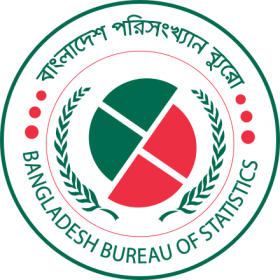
DHAKA, Dec 31, 2023 (BSS) - Country's 21.91 percent households are suffering from moderate or severe food insecurity, according to the findings of the Food Security Statistics 2023 released today by the Bangladesh Bureau of Statistics (BBS).
It showed that if the situation is classified by division, then it was found that the highest 1.42 percent households are at severe food insecurity at Sylhet Division while the highest 29.98 percent households are at moderate or severe food insecurity at Rangpur Division.
On the other hand, the lowest 0.51 percent households were at severe food insecurity at Rajshahi Division while the lowest 16.40 percent households were at moderate or severe food insecurity at Dhaka Division.
The findings also showed that 0.67 percent households experienced severe food insecurity while 22.83 percent households moderate or severe insecurity in Barishal Division followed by 1.16 percent households severe food insecurity and 19.66 percent moderate or severe insecurity at Chattogram Division, 0.64 percent severe food insecurity and 16.40 percent moderate or severe food insecurity at Dhaka Division.
The dissemination Programme of the key findings on "Food Security Statistics 2023" was held today at the BBS auditorium in the capital.
Statistics and Informatics Division Secretary Dr Shahnaz Arefin spoke at the function as the chief guest while Director General, Food Planning and Monitoring Unit (FPMU), Ministry of Food, Md Shahidul Alam and Chief of the General Economics Division (GED) Khan Md Nurul Amin spoke as special guests.
BBS Director General Mohammad Mizanur Rahman chaired the Programme. BBS director Alauddin Al Azad gave the address of welcome while project Director Md Abdul Halim made a power-point presentation on the findings. Statistics and Informatics Division joint Secretary Dr Dipankar Roy moderated the question and answer session.
For conducting the survey data were collected from 29,760 households across the country.
The findings showed that in Khulna Division, some 1.09 percent households experienced severe food insecurity while 22.07 percent households moderate or severe food insecurity followed by 0.53 percent households at severe food insecurity and 26 percent households at moderate and severe food insecurity at Mymensingh Division, 0.51 percent households at severe insecurity and 25.01 percent households at moderate and severe insecurity at Rajshahi Division, 0.84 percent households at severe insecurity while 29.98 percent households at moderate and severe insecurity at Rangpur Division, 1.42 percent households at severe food insecurity while 26.48 percent households at moderate and severe insecurity at Sylhet Division.
If the food insecurity of households are considered by residence, it was found that 0.95 percent households are at severe insecurity while 24.12 percent households at moderate or severe insecurity in the rural areas, 0.67 percent households at severe insecurity while 20.77 percent households at moderate or severe insecurity in the urban areas.
Besides, some 0.41 percent households were at severe insecurity while 11.45 percent households at moderate or severe insecurity at city corporation areas.
Speaking on the occasion as the chief guest, Statistics and Informatics Division Secretary Dr Shahnaz Arefin said that the main objective of the survey was to have a clear perception about the food security and insecurity situation in the country.
"This is an important survey for not only BBS, but also for the whole of Bangladesh," she added.
Director General of FPMU Md Shahidul Alam said that efforts are on to publish a dashboard on the country's food system.
Mentioning that the wastage of food from the production level to consumption level varies from 31 percent to around 50 percent, he said that if such wastage could be minimized, then food insecurity could be addressed to a large extent.
Considering the growing diverse food intake trend of the country's people, Shahidul said that the definition of food could be changed in the country coming out of the concept of major food like rice and bread.
GED Chief Khan Md Nurul Amin said that this survey would play an important role in assisting the government in preparing food related policies.
The survey showed that if the food insecurity is considered by expenditure quantities, then 1.72 percent poorest suffer from severity while 36.84 percent moderate or severe followed by 0.68 percent poorer witness severity while 24.54 percent moderate or severe, 0.60 percent middle class suffer from severe food insecurity while 18.85 percent moderate or severe.
On the other hand, 0.59 percent richer class experience severe food insecurity while 14.75 percent moderate or severe food insecurity, 0.41 percent richest class suffer from severe food insecurity while 11.43 percent moderate or severe food insecurity.
Considering food insecurity by status of employment,0.83 percent of people at work suffer from severity while 21.23 percent moderate or severe insecurity. Some 0.86 percent people who do not work witness severe food insecurity while 22.56 percent moderate or severe food insecurity.